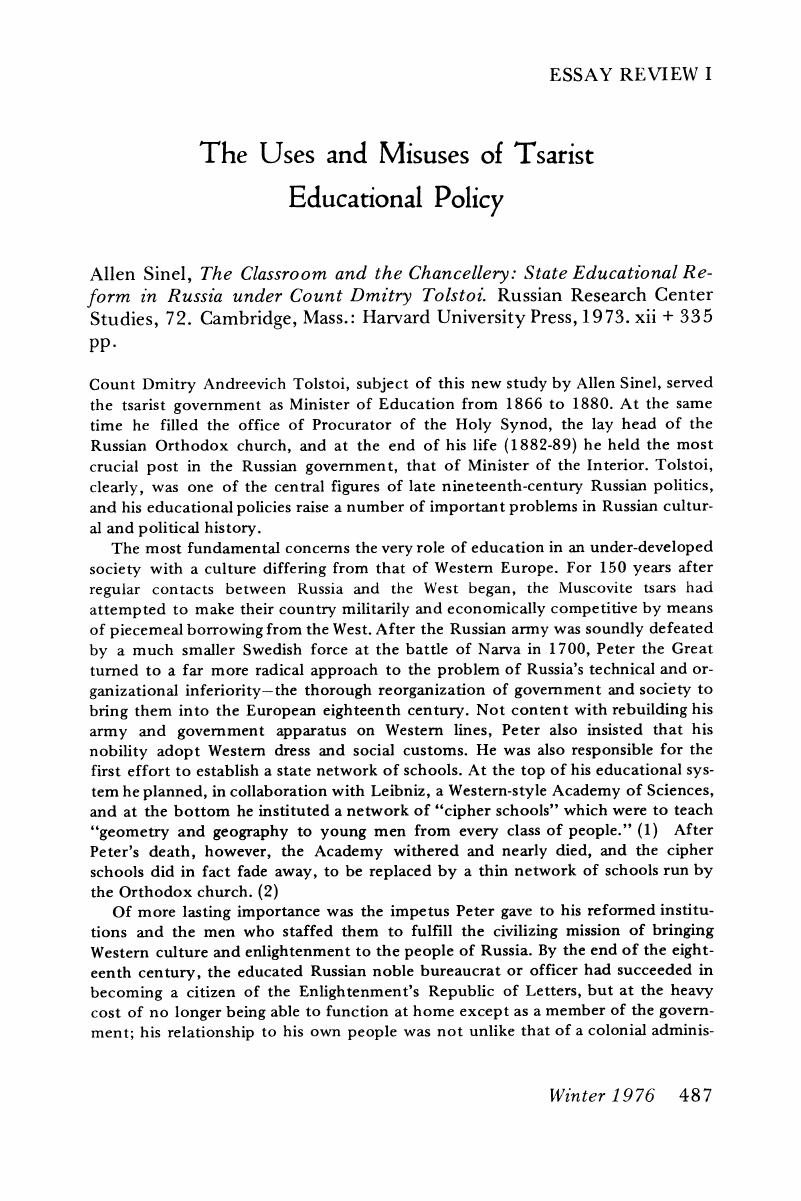No CrossRef data available.
Article contents
The Uses and Misuses of Tsarist Educational Policy
Published online by Cambridge University Press: 24 February 2017
Abstract

- Type
- Essay Review I
- Information
- Copyright
- Copyright © 1976 by New York University
References
Notes
1. Quoted from a 1715 ukaz in Alston, Patrick L., Education and the State in Tsarist Russia (Stanford, Calif., 1969), p. 5.Google Scholar
2. Ibid., pp. 4–7.Google Scholar
3. Raeff, Marc, Origins of the Russian Intelligentsia: The Eighteenth-Century Nobility (New York, 1966), pp. 148–72.Google Scholar
4. See the discussion of the government's monopoly of “system,” and the dilemma this created in attempting to administer the country, in Yaney, George L., The Systematization of Russian Government (Urbana, Ill., 1973), pp. 35–50.Google Scholar
5. Alston, , pp. 8–11.Google Scholar
6. Quoted, ibid., p. 23, from the 1803 Provisional Rules for National Enlightenment.Google Scholar
7. Ibid., p. 19.Google Scholar
8. Unfortunately, neither Alston nor Sinei indicate if there was any objective basis for the government's fears that the universities were hotbeds of revolutionary sentiment.Google Scholar
9. Blackwell, William, The Beginnings of Russian Industrialization, 1800–1860 (Princeton, N.J., 1968), pp. 329–86; Riasanovsky, Nicholas V., Nicholas I and Official Nationality in Russia, 1825–1855 (Berkeley, 1959), p. 215 discusses Nicholas's interest in technical education.Google Scholar
10. See, in this respect, Riasanovsky, Nicholas V., Russia and the West in the Teaching of the Slavophiles (Cambridge, Mass., 1952), pp. 145–46.Google Scholar
11. Pintner, Walter M., “The Social Characteristics of the Early Nineteenth-Century Russian Bureaucracy,” Slavic Review, 29, (September 1970):439–41.Google Scholar
12. The phrase came from an article by Pirogov, N. I., a surgeon who had achieved fame during the Crimean War, and who later held a number of important posts in the field of education. Pirogov's views are discussed briefly in Sinel, pp. 25–27, and at somewhat greater length in Alston, especially pp. 64–70.Google Scholar
13. Kornilov, Alexander, Modern Russian History, translated by Kaun, Alexander S. (revised and reissued ed.; New York, 1970), II, 164.Google Scholar
14. Alston, , p. 94.Google Scholar
15. Izgoev, A. S., “Ob intelligentnoi molodezhi,” Vekhi (2nd ed.; Moscow, 1909), pp. 102–103. (Translated by the author and Shatz, Marshall.)Google Scholar
16. See, in this respect, Brower, Daniel R., Training the Nihilists: Education and Radicalism in Tsarist Russia (Ithaca, N.Y., 1975), which argues that the radical intelligentsia was an inescapable by-product of the elite educational system. See especially pp. 105–45, passim. Google Scholar
17. Most observers would agree that at the end of the tsarist regime the country was not well-governed, though whether the fault lay with the bureaucrats or the people cannot easily be resolved. In regard to technical education, when Sergei Witte, Minister of Finance at the end of the century, wished to encourage industrial development, he found it necessary to establish an entirely new network of commerical and vocational schools. von Laue, Theodore H., Sergei Witte and the Industrialization of Russia (New York, 1963), p. 98. Complaints about the competence of the members of the free professions are not generally encountered. Memoirs recalling university life remember some professors with great affection and esteem, while others, perhaps most, are dismissed as dull and out of date—this response is probably typical of that of most students to their university instructors at most times. Memoir literature leaves the impression that in the late nineteenth century the university years were the most stimulating and satisfactory in the authors' lives. Technical education is surveyed exhaustively in Leikina-Svirskaia, R. V., Intelligentsiia v Rossiivo vtoroi polovine 19-ogo veka (Moscow, 1971), but she too limits herself to published accounts and does not consider the question of the quality of education provided.Google Scholar




